73. Change
The normal high and low for March 25 is 60 degrees and 40 degrees respectively. We topped those norms today by 20 degrees and then some. The same is expected for tomorrow, except that some precipitation is also expected. Today's weather was as close to perfect as might be expected for the first week of Spring. Of course, here along the Left Bank of the Ohio River at Milepost 606, or anywhere in the Ohio Valley, the weather is always subject to change, and some of those changes can be huge.
Change is one of those unchanging things in our lives. Like taxes and death. Although since the late 1970s, taxes have become less and less a part of our lives as governments at all levels, through the politicians we elect, have repeatedly lowered taxes or repeatedly exempted more and more groups from taxation. Some people think this is a good thing, saying that "the best government is that which governs the least." I do not accept that. The saying should be "the best government is the government which governs the best." Doing so requires adequate and appropriate taxation. Any politician who promises "not to raise taxes" a la Grover Norquist, is automatically precluded from any consideration from me. Of course, saying the opposite, as Walter Mondale did in 1984, is a sure way of getting yourself defeated, although Mondale had other problems as well, one of which was his opponent's affability, despite being one of the worst Commanders-In-Chief the American voters have ever hoisted upon themselves. But Mondale was right. Reagan lied when he said he would not raise taxes. He did raise them in 1986 just as Mondale said he would. Reagan lied a lot. But the American public believed him; he may have even believed himself.
As I said, President Reagan, for all of his inablilty to understand government, was a likable guy. He smiled and America smiled with him. When he was wounded a short two months into his first term, America helped nurse him back to health. When he reentered the hospital four years later for the removal of some cancerous mass, again America responded with open hearts. We all remember the president and Mrs. Reagan waving from the hospital window during his recovery from the cancer surgery in 1985. It was Reagan who finally restored the dark shadows left over the presidency from the failures of Nixon, the inflation of Ford, and the 444 days of captivity in the Iran Hostage Crisis under President Carter. America likes a likable guy as president.
When George W. Bush was selected by the United States Supreme Court to serve as our Republic's 43rd President (by a one vote margin), America thought it had another likable guy coming into office. The saying went around the country, both in the race against Al Gore, and again four years later against John Kerry, that you'd rather have a beer with George Bush than either of the other two. Again, with Reagan, a few beers had been taken, including a few celebrated ones with former Speaker of the House Thomas P. "Tip" O' Neill. Think about it - have you ever seen any pictures of Bush fils having a cold one? Like me, Bush has given up alcohol officially. I gave it up in September, 1996, although I've been known to have a glass or two of wine now and then. This past election night, anxious and happy about the ascendance of my political party after twelve years in the wilderness, I opened a bottle of Old Forester Bourbon (a Brown-Forman product) at 6:30 pm, against the advice of my friend Aaron Horner, who suggested I wait until a little later. By the end of the night, I had finished that bottle and started on another one, but I was happy. I knew that at least partial control of the Republic had been restored to reasonable, intelligent, and hopefully questioning souls. I had every right to celebrate, not just for the win of my friend John Yarmuth, and that of Baron Hill over on the Right Bank of the Ohio River, but far more importantly all the folks who had been struggling to understand what had become of the America we all knew and loved. On that night, we had all won. But, I digress.
The question is "Is George Bush (still) someone you'd like to have a beer with?" I am confident that a great deal of people would answer that question negatively. The truth is, some people are so fed up with his snide remarks, constant smirk, and apparent inablilty to deal with being wrong, they would just as soon never having to encounter him for fear of giving him a piece of their mind, and maybe accidentally calling up some pugilistic efforts to set the man on a path of rightful thinking. He simply refuses to accept that he, damn near personally, lost the election in 2006. While his name wasn't on the ballot, it was certainly on the minds of many voters.
Now the time is upon us when we voters are beginning to pay attention to the votes of those we sent to Washington to serve as our "hearts and voices" in the Halls of Congress. One of the things we are looking for is the role of the Congress in the system of Checks and Balances, especially on the Executive branch of the Republic. A few days ago Tony Snow, the White House spokesperson, suddenly bereft on the most elementary aspects of a constitutional republic, made the comment about the Congress, "It does not have constitutional oversight responsibility over the White House . . . . ." The appropiate response to Mr. Snow for such idiocy is What the Fuck?
Just as a reminder to the hapless Snow, the Congress does have some authority. First and foremost, it has impeachment power [Art. I, Sect. 2, Para. 5 and Art. I, Sect. 3, Para. 6]. One house brings the charges, the other house holds the trial. It has veto power if it has enough votes, which unfortunately we Democrats currently do not have [Art. I, Sect. 7, Para. 2]. Importantly in the current discussion, it has the power to declare war, and arguably then, the power to undeclare such a declaration [Art. I, Sect. 8, Para. 11]. To pay for a war, among other things, it has the power to levy taxes, thus producing income, and then has the responsibility to responsibly use that income for the good of the Republic [Art. I, Sect. 8, Para. 1]. Again, arguably, if it has the power to fund a war, it also has a power to defund such a funding. All of these powers are delineated in the United States Constitution as noted.
But what is important for me and other voters like me is not that Tony Snow understands the Constitution. In the current administration, that is asking far too much. Since the president and his co-horts in crime aren't willing to follow the Rule Book, Senator Byrd's pseudonym for the Constitution, then it is imperative that the Congress do so. It is imperative that the Congress hear the hearts and voices of those who by their votes hired them as their representatives. We did not ask for change only to be presented with lukewarm nuances toward some minimal nudgings in the direction of the country. When voters in Kentucky's Third went from Anne Northup, a former moderate Republican who over time had become a confirmed conservative ideologue with tendencies toward a plutocracy, to John Yarmuth, an avowed liberal with 800 pages of opinions to prove it, that was a vote for real change.
I described last week's vote in the House on the War and its funding as "a start." That is all that it is. It is imperative that votes of this nature, that is votes which are prima facie antagonistic to the president, are continually raised and continually passed. Eventually other members of Congress will get the message that the dissidence isn't going away. The president has promised not to be worn down by these votes. Conversely then, the Congress should promise not to be worn down by his inability to accept that the America which elected him in 2004, and the one which came close to electing him in 2000 (but didn't), has changed. Change is inevitable. And an inablilty to change with the changes confirms a more important inability to govern a changing country. Bush has confirmed this. He lacks the ability to govern. It is time for the Congress to assert itself by votes such as the one it took last week 218-212 telling the president that the time to change is now.


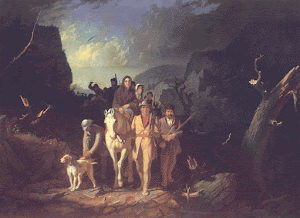












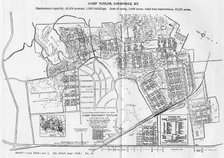


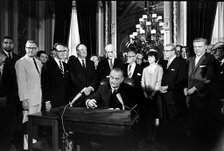




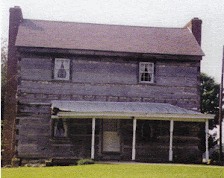
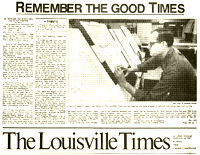


No comments:
Post a Comment